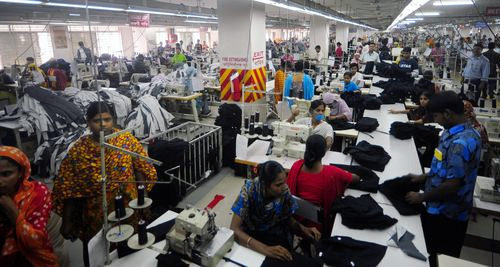Reuters
Apr 23, 2015
Bangladesh garment workers still face abuse, danger despite reforms
Reuters
Apr 23, 2015
Two years after the deadly collapse of the Rana Plaza complex, employees in Bangladesh's garment sector still face exploitative and dangerous working conditions despite government labor reforms, Human Rights Watch (HRW) said on Wednesday.
While the government and global brands have made progress in improving safety conditions for Bangladesh's millions of garment workers, many still contend with abuse at work, delayed wages, and threats when they try to form a union, an HRW report said.

"Clearly, it is not enough to focus on safety alone," Phil Robertson, the rights group's Asia deputy director, said in a statement.
"Recent tragedies at Bangladeshi factories demonstrate that dangerous working conditions are linked to the failure to respect workers' rights, including their right to form unions which can help them to collectively bargain for improved safety."
The Bangladeshi government denies that factory workers are facing difficulties in trying to unionize.
"If we receive any complaints from the trade union leaders that they are facing harassment or obstruction for forming trade unions, we immediately take stern action," Labour and Employment Ministry secretary Mikail Shipar, told Reuters.
The government has filed more than 100 cases against factory owners or managers since the law was amended, he said.
The collapse of Rana Plaza on April 24, 2013, killed more than 1,100 garment workers, shone an unprecedented light on unsafe working conditions in Bangladesh's thousands of garment factories and created urgent demands for global retailers to do more to ensure their workers' safety.
The $24 billion industry is now in the throes of a massive safety overhaul, and more than 2,000 of the country's 3,500 exporting garment factories have been inspected by the government or as a result of retailer-led initiatives.
But gains for workers' rights in those factories have been slower to materialize.
On the morning that Rana Plaza collapsed, surviving workers reported that managers had ignored their concerns that the building was not safe - a scenario that observers said could have been avoided if workers had better union representation.
Since then, the labor law has been amended to make it easier to form unions, among other measures, and more than 300 new labor unions have been registered, the government says.
However, workers interviewed by HRW said they were still being beaten and threatened at their factories for trying to organize, or stand up for co-workers' rights.
The garment industry accounts for more than 80 percent of the South Asian nation's export earnings and employs some four million workers, providing a crucial source of income to women in particular.
A multi-donor fund set up to compensate workers injured in the Rana Plaza collapse and victims' relatives is still short by about $6 million, the International Labour Organization says.
Rights groups say that shows the enduring lack of commitment by retailers to those who make their clothes.
"Instead of putting the slightest fraction of their profits toward the very people that suffered the most making their clothes, these brands choose to make ever more flimsy excuses," Ineke Zeldenrust, international coordinator of the Clean Clothes Campaign, said in a statement.
© Thomson Reuters 2024 All rights reserved.

























